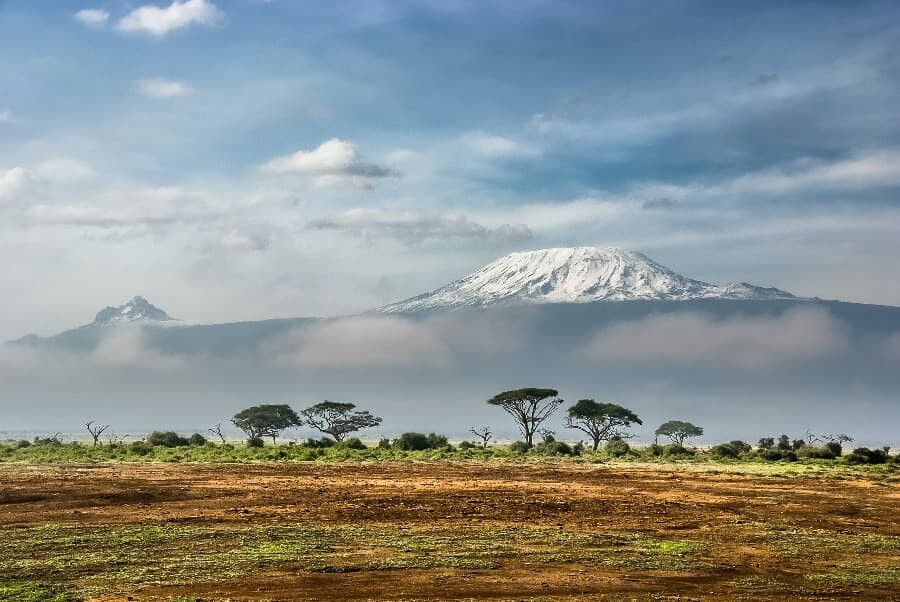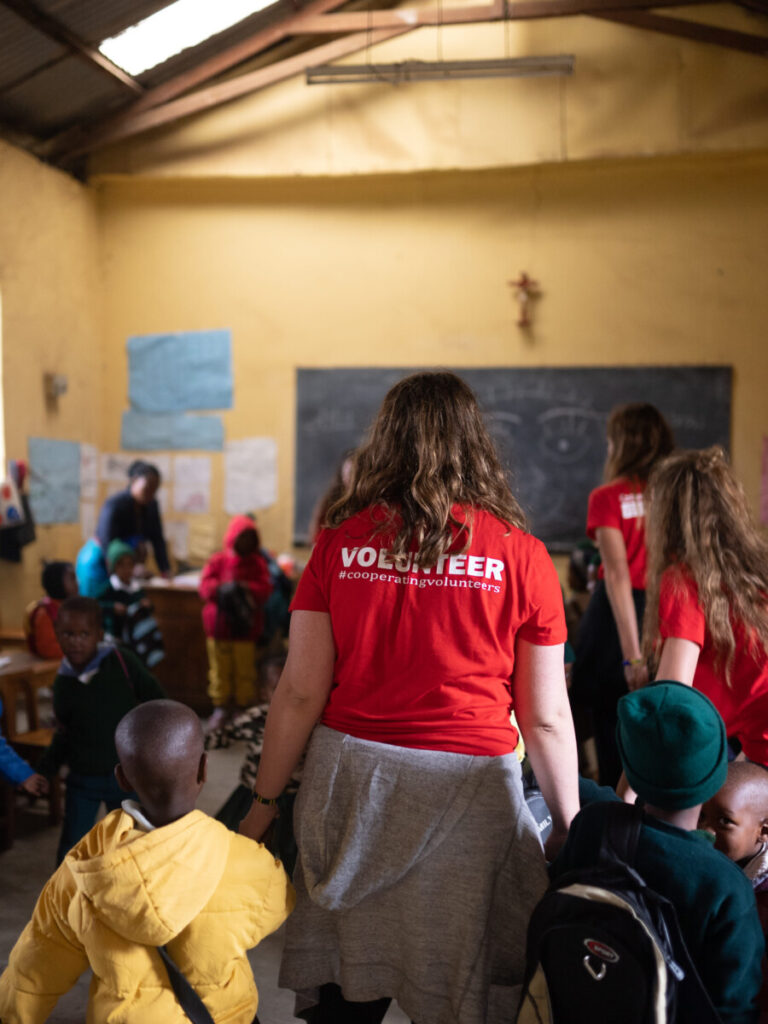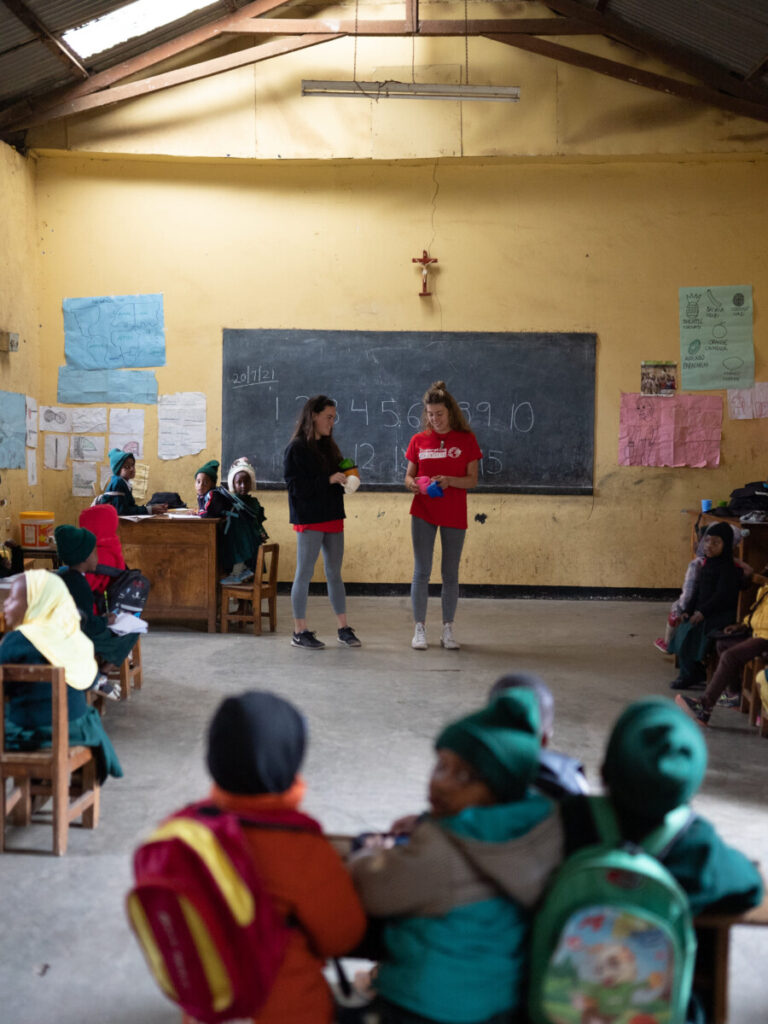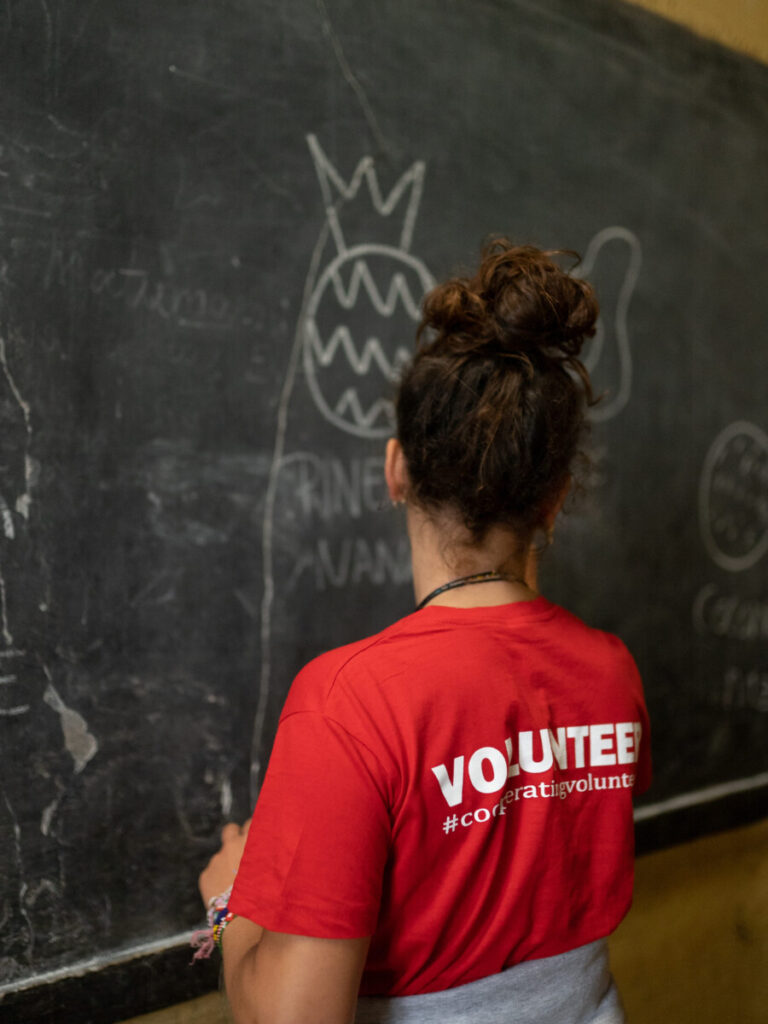Menu Apply

Tanzania is a country situated in East Africa. It is bordered to the east by the Indian Ocean, to the north by Kenya and Uganda, to the west by Rwanda, Burundi, and the Democratic Republic of the Congo, and to the south by Zambia, Malawi, and Mozambique. Tanzania has a population of approximately 37 million people. The country’s capital city is Dodoma, and the official language is English.
The climate in Tanzania is tropical, characterized by high yet moderate temperatures and high humidity in the environment. Rainfall is more abundant on the coast and near Lake Victoria and Lake Tanganyika.
From March to May, there is a period of increased rainfall and storms that render some areas of the country inaccessible. From May to October, a dry season prevails. In November, another rainy season begins, lasting until December, followed by another, though smaller, dry season.
Volunteers in Arusha will experience a climate that mirrors the overall climate of Tanzania, with a significant amount of rainfall, and an average annual temperature of approximately 19 degrees Celsius.

Tanzania is in the East Africa Time (EAT) zone, which is UTC+3, and it does not observe Daylight Saving Time.

The official currency in Tanzania is the Tanzanian shilling. 1 Tanzanian shilling equates to 0.0004 euros.

The programs are located in Arusha. The stay begins as soon as the volunteer is picked up at the destination.

If the volunteer wishes to stay an additional night, they will need to pay an extra cost of 35 €

The meals included in the project/destination will be provided at the accommodation. Meals will not be included for the journeys to the destination, excursions, etc.

The stipulated pick-up times for each destination/project must be respected. Volunteers who arrive outside of this time frame will have to pay an additional cost, depending on the destination.



The programs are located in Arusha:
All our programs are located in the Arusha District, in the northeast of Tanzania. This highly popular area where tourists visit and learn about the local Masai way of life while also experiencing the natural surroundings. Numerous attractions such as Lake Manyara, Mount Meru, Kilimanjaro, Serengeti, and Ngorongoro are nearby and are the wonders of the region.
Volunteers need to make their own way to the Kilimanjaro International Airport (airport code JRO), where they will be picked up by local staff and then transported to their accommodation.
Typical Tanzanian dishes tend to contain rice and exotic and wild meats, presented in a kebab-type format. The use of vegetables is also notable, with aubergine and onions featuring heavily. Tanzania’s most typical dish is ‘ugali’: a cassava purée that is served with meat, vegetables and rice. In Arusha in particular, given the huge number of coffee plantations, many inhabitants enjoy this drink.
It’s easy to get from one city in Tanzania to another by plane, as there are airports in each of the country’s main cities and some of its national parks. However, the cheapest and easiest way to get around is by bus. Despite this, the roads aren’t in a very good condition. The journeys can sometimes take longer than expected, with the drivers required to navigate various obstacles. Some companies offer a higher quality trip, although these packages are usually more expensive.
The volunteer house is located in a peaceful neighbourhood in Njiro, in the outskirts of the city. The house is a 5-minute walk from the Cinema Centre, where you can find restaurants, cinemas, cash points, a western-style supermarket and other shops. To get to the city centre, you can take a “dala dala” bus or a taxi, with these journeys taking roughly 10 minutes.
Volunteers can travel from the residence to the project site by “dala dala” bus, with a return journey costing approximately €1 per day.
In Arusha, the main attractions are its safaris. Located in a key area for safaris, volunteers can make the most of their free time and enjoy an organised trip which provides an excellent opportunity to discover the local flora and fauna. There are several beautiful national parks located just outside of Arusha, such as the Serengeti National Park.
Located in East Africa, this project is situated in one of the most demographically diverse countries on the continent. It offers an opportunity to help children who, due to the challenging circumstances they face, require an educational environment more than ever.
Volunteers will work in schools for young children, nurseries, or orphanages, where they will care for the children, organise play activities, teach basic concepts, and in the day centres, where the primary focus is spending time with the children and ensuring personalized attention for all.
For some children coming from disadvantaged or complex backgrounds, all they need is a little care, attention and love.
The volunteers’ objective is to spend quality time with the children, fostering strong bonds and creating a nurturing and comfortable environment for them.
The program takes place in one of the medical centers in the Arusha community. These centers have gradually developed from being primary care facilities or facilities for pregnant women and children to becoming significant medical centers in Arusha. Some of the medical departments include obstetrics/gynecology, pediatrics, maternity, radiology, dentistry, and care activities, as well as treatment and coordination for people living with HIV, and an operating theatre (which performs an average of 50-70 procedures each month).
As a volunteer, you will participate in a variety of activities depending on your skill level and education. Your day-to-day tasks will involve providing support to local doctors, nurses, and other healthcare professionals who offer both hospital and outpatient care. This may include monitoring, observing, and providing health education information to the community. The program is ideal for medical or nursing students who want to learn about healthcare in Africa.
Goals and objectives
The Medical Volunteer Program carried out by participants from the healthcare field who have not completed their training and/or are not licensed in the corresponding Professional College, will consist of providing care and assistance under the supervision and direction of a Healthcare Professional who meets the aforementioned requirements. Their role in the Medical Volunteer Program will involve assisting and accompanying Professional Healthcare Medical Personnel.
Minimum duration: 2 week
IMPORTANT: required to be studying at least 3rd year of Medicine or Nursery
Several primary and secondary schools throughout the Arusha district wish for us to organize English learning programs in which volunteers have the opportunity to teach various subjects alongside local teachers. You will have the opportunity to teach mathematics and science to students at various levels.
You’ll assist local teachers in teaching basic English by singing songs and playing educational games. You can also engage the children in activities such as handicrafts, sports, drawing, colouring, writing and more! Many of these children are quite young and require attention and engaging activities to help them thrive.
Working hours may vary depending on weather conditions, local circumstances, and unforeseen events.
Accommodation: You will be accommodated in a volunteer house in Arusha.
IMPORTANT: A Summer School will be conducted during the school holidays. After you have submitted your application and received the Confirmation Email, you will be sent the school holiday calendar as an attachment.
This program is run at a public school with a Special Education Unit in Arusha, which serves children with different functional diversities, such as
deafness, autism, blindness, and albinism. The center combines basic education with practical activities aimed at developing autonomy and daily living skills.
The school serves 138 children, 73 of whom live permanently at the center due to the distance from their communities of origin. The rest attend during the day, from 8:00 a.m. to 1:00 p.m. In addition to classroom work, the center promotes simple training workshops, such as
sewing or hairdressing, adapted to the abilities and pace of each student.
Participants are integrated into the daily dynamics of the center, collaborating in support tasks within the classroom, recreational activities, practical workshops, and shared routines
such as gardening, cooking, or caring for the spaces.
Participation is based on continuous support, respect for local educational processes, and the creation of a stable and safe environment.
This program is aimed at people with social sensitivity, patience, and adaptability, who are interested in learning about special education work from a community-based and contextualized perspective.
Upon the volunteers’ arrival at the airport, the local coordinator will pick them up and accompany them to the accommodation. They will spend the following days with other volunteers. After settling in, a welcome meeting with local staff and coordinators will be held to provide information about the area, explain the standard rules and schedules, and outline the program that will be implemented.
Accommodation in Arusha is provided in a volunteer house (guesthouse type) where volunteers stay in gender-separated rooms, typically accommodating between 2 and 6 people.
Meals are inspired by the local cuisine and include maize, rice and plantains. Beef, goat meat, beans and green leafy vegetables are incorporated to provide essential nutrients throughout the week.
Transportation from the lodge to the projects can be done on foot to reach the nearest projects or by local transport, such as Dala Dala or tuk-tuk. The journey typically takes no more than 30 minutes, although there can be morning traffic.
The total cost of volunteering is divided into two parts: the registration fee, which is paid to book your placement (210€), and the program cost, which is paid separately at a later time.
380€ per week
380€ per week
380€ per week
1 week: €430
2 weeks: €810
3 weeks: €1,240
4 weeks: €1,620
5 weeks: €2,050
The medical program has an additional cost of €50 for every two weeks of the program, which is already included in the above prices.
Visa, flights, travel insurance (obligatory), vaccines, return to the airport, and other personal expenses.
(*** Volunteers in Tanzania will generally find that €40 (approx. 50 USD) is enough to cover basic weekly expenses.)
| Address: | New York, United States |
| Address: | Avinguda Carrilet, 3, Edifici D, planta 2a, 08902 L’Hospitalet de Llobregat (Barcelona) |
| Phone: | +34 931 890 904 - Office- Barcelona |
| Email: | hello@cooperatingvolunteers.com |
| WhatsApp: | +34 671 94 28 89 |

Cooperating Volunteers, S.L. All rights reserved © 2014
Leave us your information and we will contact you within the next 24 hours
Our volunteers will be able to validate university credits with the aim of traveling in a more responsible and economical way.
What does volunteering focused on university practices involve?
At Cooperating Volunteers, we make agreements with different universities to validate university credits with the aim of traveling in a more responsible and economical way.
The specialties we work with are extensive: medical volunteering, nursing, education, social work, psychology, physiotherapy, engineering, architecture…
The practices can be carried out in our designated destinations for this purpose, as well as in Spain.
If you choose an international destination, it’s a unique way to live an unforgettable and enriching experience, as you will have the opportunity to continue your education in another country, with a completely different culture.
Stepping out of our comfort zone and being part of the various projects at the destination will allow us to grow both personally and professionally, creating a more extensive curriculum.
And we are fully convinced that this experience will accompany you throughout your life.
You will be able to visit hospitals, schools, centers, orphanages, and participate directly and actively in the daily lives of all those people at the destination, always accompanied by other professionals willing to collaborate hand in hand with you and guide you in daily tasks.
If your university is not part of the agreement with Cooperating Volunteers, you can contact cristina@cooperatingvolunteers.com so that we can get in touch and make this experience a reality.
Corporate volunteering consists of tailored programs for your company, designed to develop teamwork skills.
It is proven that teamwork directly impacts productivity.
Collective effort surpasses individual capabilities, promotes diversity of skills, stimulates creativity, and facilitates problem-solving in the face of various challenges.
Therefore, it not only maximizes efficiency but also enriches the work environment.
We conduct corporate volunteering programs that consist of customized programs for your company, designed to develop teamwork skills, improve performance, and foster unity among employees.
We tailor projects to the corporate identity and size of the company, and we can adjust them to any destination and time of the year.
The advantages of corporate volunteering include:
The future is aligned with a more responsible society, and participating in social projects positions our company among the list of revolutionary businesses that want to be part of the change.
If you resonate with this message, corporate volunteering is a unique experience both individually and collectively, and at Cooperating Volunteers, we accompany you throughout the process to make it a unique journey.
Quality time spent with family strengthens emotional bonds, promotes communication, and contributes to the emotional well-being of its members.
Spending quality time with family and being able to disconnect from our hectic routines is not only enriching but also necessary.
Sometimes we forget to communicate, connect, and dedicate time to each other. Each one of us lives focused on our jobs, schools… And it’s necessary to find the opportunity to pause and take care of ourselves.
Quality time spent with family strengthens emotional bonds, promotes communication, and contributes to the emotional well-being of its members. And of course, it creates lifelong positive memories.
At Cooperating Volunteers, we suggest moving away from those ‘more superficial’ trips (which can also be fantastic), but we invite you to live this experience to bring out our most empathetic and humanitarian side.
Family volunteering gives us the opportunity to be part of a positive impact, promoting values of solidarity and social responsibility.
There are many families who choose to experience these trips focused on cooperation and direct involvement with different communities around the world, where living conditions are very different and sometimes entirely precarious.
Projects are tailored to different ages, allowing us to work together.
An incredible way to fill our suitcase with memories, learning, and knowledge.
And although stepping out of our comfort zone often feels daunting, we assure you firsthand that it’s worth it.
At Cooperating Volunteers, we accompany you throughout the entire experience, from start to finish, to make it unforgettable.
At Cooperating Volunteers, we believe it’s never too late for anything, especially for volunteering and living a unique and unforgettable experience.
There are many people, increasingly so, who opt for responsible travel that involves social work.
Accustomed to organized and mostly touristic trips, at Cooperating Volunteers, we want to advocate for a more enriching experience, one that transforms us from within and allows us to be part of the change the world needs to see.
We can adapt both the destination and the duration of our projects to fit your needs.
It’s an opportunity full of emotions that allows us to significantly contribute to different communities and their evolution. And you can participate in different areas such as education, social support, or assistance in different centers.
Some of the benefits include:
Living this experience will undoubtedly be a before and after.
A volunteering initiative with leadership and impact through the educational action program.
When we talk about social volunteering, we refer to all those actions and activities carried out altruistically, selflessly, and with the aim of addressing multiple problems and needs of different communities, always focused on education and self-sufficiency.
Education is essential because it provides the tools and knowledge necessary for personal, social, and economic development.
Our goal is to create self-sufficient communities and provide opportunities for the future personal development of each member. The message is not to ‘give’, but to accompany in the process of training for self-managed provision.
At Cooperating Volunteers, many of our destinations and projects embrace this type of volunteering. Some of our projects include: community programs, education, women’s empowerment…
And although they are completely different from each other, they share a single objective: progress towards a society that can embrace us all in the same way.
If you are someone who is restless, who needs to see a change in the future, volunteering is an experience tailor-made for you.

